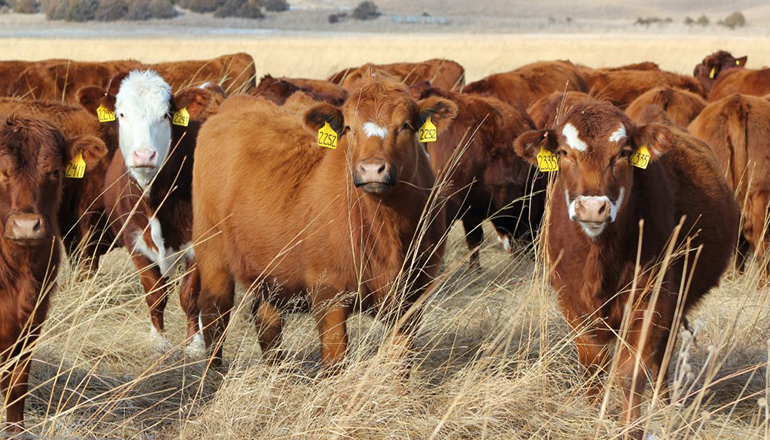Heifer prices kept going up in the fifth of six fall sales of Show-Me-Select replacement heifers, December 7th. The 74 head averaged $2,334 with the previous high being $2,099 on 64 head at Fruitland, Mo.
“Heifer quality was top-notch.” said Kendra Graham, the sale coordinator, “Buyer turnout was high and they were willing to pay for heifers they wanted.”
A new buyer source came from LiveAuction.TV. That added bids and sales of three lots, helping prices. One buyer was in Arkansas, the other at Ulman, Mo. Heifers came from beef farmers enrolled in the University of Missouri Extension educational program on heifer development. Sold heifers wear black-and-gold ear tags with the Show-Me-Select trademark. Heifers are proven in development and genetics. All are guaranteed pregnant.
The Farmington sale is the newest in the sale lineup. It takes a while for buyers to learn the value of SMS heifers. Buyers like the improved calving ease. Also, use of timed artificial insemination allows all cows in a herd to be bred in one morning which shortens calving seasons. The combination of traits cuts labor and reduces death losses at birth.
A sale benefits when a volume buyer starts bidding on lots. Shane Wilson, Dittmer, Mo., bought 26 head. The second-largest buyer, at 10 head, was Harold Fox, Ellington, Mo. The top lot, one registered Angus, brought $3,200 for Turner Farms, Belgrade, Mo. Their second heifer brought $2,800. Both carried the Show-Me Plus rating. Those have genomic testing. The second-high lot, at $2,950 per head, went for two AI heifers sold by Graham Family Farm, Farmington.
The Graham Family Farm, of Kenny and Sherri Graham, was top volume consignor in the sale at 28 head. They raise Angus crossbred heifers with eight of those black baldies and twenty were AI-bred. The second-largest consignor was Pat Gegg, Ste. Genevieve, Mo., with 25 Angus. He has both black and red Angus including some red whiteface calves. The third-largest consignor was Dean and Dallas Wilson, Dittmer, Mo., with 11 head. Those are Angus crossbred heifers with most being AI-bred. They use some Turner Farms sires for natural service.
Farmington, south of St. Louis, had more rainfall than most of Missouri last summer. “Grass and hay supplies are much better than other parts of Missouri,” Graham said. Forage shortages cause concern among buyers in other areas. Bidders wondered if they had enough hay to feed additional heifers.
At the sales, all heifers are inspected by graders from the Missouri Department of Agriculture and any with flaws are sent home. All are pregnancy-checked twice before the sale. Producers can join the SMS program by contacting their regional MU Extension livestock specialist. Local extension centers can help.
Basic research on management and genetics comes from MU Thompson Farm, Spickard, Mo. That is part of the MU College of Agriculture, Food and Natural Resources, Columbia.







